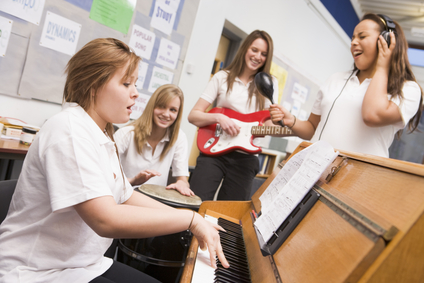Ever find yourself humming a song, or hearing a song in your head? Sometimes we find ourselves singing the same song over and over all day long, even if we can't stand the song! The fact is, music is just a part of us.
We are exposed to music from the day we are conceived. We can feel and hear it in the womb. Many of us on our day of birth can hear our Mother singing, "Rock-a-bye-baby." That turns to "Happy Birthday" every single year after that. Everyone has certain songs that invoke strong memories from the past. How about that special wedding song?
Music can make us laugh, and it can make us cry. Music is a part of our soul. Music education is important to our growth. It helps our brains process information better. Students involved in music get higher grades in Math and other subjects. They do better on their SAT scores. It improves self-esteem and social skills.
Everyone would love to play an instrument. Who wouldn't love to walk over to the piano at a party and be the life of the party?
Music is a birthright. We are all capable of learning and mastering it. So the question is: why don't we? Why are normal attrition rates at around 80%? The answer is simple: we do not fail the system; the system fails us.
Theory and Notation
Sheet music represents the universal language of music notation...a visual interpretation of what we call "Music Theory." It's a system of dots, dashes, circles, lines and other hieroglyphics that is richly layered with centuries of historical evolution and meaning.
The preferred method of teaching piano is to immediately introduce theory and notation, marking learning far more difficult than it needs to be. That is why there is such a high failure rate for most of us in learning to play. Focusing on the translation of notation as a first step is difficult for most of us and it is one of the contributing factors making practicing painful and un-enjoyable.
So how can we turn the odds in our favor at succeed at piano lessons?
- Reverse the process. Music is a language, and like learning any second language, it is difficult. We learn to speak our own language naturally, not by going to school. Then, once we are in school we learn how to "read" that language. In music, we learn the "written language" first (notation) then learn how to play. This is contrary to the way we naturally learn our language, and that's what make it so hard.
- Make it fun. First, make it fun and enjoyable. If it isn't fun, do you think a child would rather play their video games than practice? Don't be pushy and let your child learn at his or her own pace. They'll tell you (either verbally or through results) when it's time to take the next step. Stick with it, and you can beat the odds.
Failure is not an option.
-------------------------------------
Vincent Miele is an accomplished musician and consultant for Allegro Multimedia. To learn about the Piano Wizard, please visit https://pianowizardacademy.com
Article Source: http://EzineArticles.com/?expert=Vincent_Miele
http://EzineArticles.com/?Piano-Lessons---Failure-Is-Not-An-Option&id=385337


Thank you!
Please share Piano Wizard with your friends and help spread the joy.